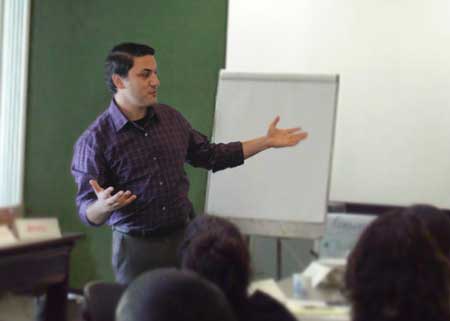Raitis: Hi, I’m Raitis Stalazs, founder of setgoalstoday.com. I am here with an exclusive interview with Peter Khoury for our book club. Peter Khoury is the author of Self-Leadership Guide: Be empowered Be motivated. Peter, welcome.
Peter: Hi, Raitis, how are you?
Raitis: Doing great. Would you be so kind and tell us how you came up with the idea that you needed to write this book? Also, if you could provide a short description, what is the topic of your book?
Peter: I think everybody has a book in them and I always looked up to my great-uncle, he didn’t even have a high school education and he wrote and published four books. I’ve always wanted to write a book; I just didn’t know what I wanted to write. As you know, my background lies in engineering. Ten years ago, I shifted my career from engineering to professional speaking. When I changed my career to professional speaking I wanted to speak on leadership, conflict management, negotiation skills and this is is the area I concentrated on when writing my book. My thoughts for this book germinated and expanded.
Raitis: Very nice. I believe what you said, we all have these ideas for a book within us … I have a couple of ideas for a book yet haven’t written anything yet, but it’s like every time I talk to authors I think to myself “I can do this, I can do this.”
Peter: I think we have multiple books in us.
Raitis: Yeah. Why self-leadership?
Peter: When I started speaking on leadership, the one question I noticed that so many people, they would ask “How can I lead people? How can I influence people?” I noticed that what they lack is self-leadership, they can’t even lead themselves. I wanted to create something for them, just so they can learn more about who they are, what do they want in life, what do they want in their career. Specifically, I wanted to concentrate on helping people with career management and help people find clarity in this area of their life.
Once they’re able to gain clarity, then they know exactly what they want in their careers, and then that ability to be great leaders surfaces. That’s why self-leadership.
Raitis: A lot of people don’t consider themselves as a leader, what would you say to them? It’s like “I don’t need this. I’m not really in charge of people. I’m not planning to lead anyone.” “Why then should I bother to read this book?”
Peter: Yes, during a keynote speaking opportunity last week, and my take-home message was “leadership is your moral obligation.” Especially if you’re smart and especially if you have ideas. A lot of times smart people sit back and relax, they hide, they say “It’s not my responsibility to lead, I’ll just do my job, it’s their responsibility to lead.” Unfortunately, when we ignore that call to leadership, then more often than not, a person that lacks those leadership qualities ends up on top. They end up leading our organizations; then we end up suffering.
It’s our moral obligation to lead, and it all starts with you leading yourself because once you take charge of yourself, then you’ll lead and you’ll not feel like a hypocrite or have that belief of being incapable. You’ll lead based on integrity because you know what you want and you know how to get it.
Raitis: I think that’s so true. I feel like the more I work on myself, the better leader I become. It starts with you, and I could not agree more with that. People are going to pick up this book and read it. My favorite question is how do you get the most out of this book? How do you suggest you read the book? Do you read a chapter try to implement the suggestions or what’s your take on gaining the most from the reading?
Peter: This is a very simple book. It’s a guide. It’s supposed to take you from point A, not knowing what you want at work to exactly what you need at work. It goes chapter by chapter; it guides you through the process. I would recommend going through it one chapter at a time. In the end, the last chapter, tells you on how to apply the material to influence other people, to lead other people. That’s why it’s crucial to go from start to finish.
Raitis: I think to tackle one page at a time, one chapter at a time, that’s [inaudible 00:04:50] good. I agree that’s one of the things I like, I don’t like really big books, I like simple books, get to the point, get a lot of value out of it, that’s why we are so excited to have you as part of our book club. If you look back on your career and I can’t help but think “Wow if I only knew this information before what changes would I make?”
Peter: When I was an engineer, I wasn’t very happy. I know that goes for many professionals out there, they’re not happy with their jobs. I would go from one job to the other; I got promotions because I was good at my job. I started a small business on the side, all of this was just for the purpose of relieving my pain because I wasn’t happy.
If I had the information in this book back then, I think it would’ve made a huge difference in my life. I wasn’t happy; I didn’t know why I kept jumping around trying to find why I wasn’t happy or what would lead me to happiness. If I had this book and had this knowledge, I would’ve known exactly, just by going through this book in an hour or two, I would’ve known exactly what I needed to do in my career, in my life, to be happy. Honestly, sometimes I will reflect back and will discuss with my wife, saying “If I knew this, maybe I would’ve never left engineering to begin.” Because I could’ve figured out how to make my life happy back then.
Raitis: I like that, make your life happy back then, it’s like so … The next question that sparks my curiosity is you see a lot of people unhappy with their jobs, and that’s one of the common things that I see with the people that I help. The people that are part of our platform, they are always searching, they want to improve, they’re always searching for a happier place. In your opinion, do you think it’s really about the job? Do you believe that we create this ourselves?
Peter: It’s never about the job. I think the job is just a marker that people will go through “Okay, I’m not happy with this job, I’m going to move to this job. I’m not satisfied with this job; I want to go to this job.” When, in fact, it’s your criteria for what makes you happy in a job. Because you can meet that criterion, you can meet that criterion being an engineer, reporter, an entrepreneur; you can meet that criterion doing anything.
Once you know what you want, exactly what you want, you understand your personal standards this is what will keep you happy; then you can lobby and advocate for yourself. Once that criterion is fulfilled, you’re happy. Of course, that changes over time; then you need to be able to go and reevaluate, readjust your work, that’s how you maintain a level of happiness. I’m an entrepreneur now, I run Magnetic Speaking, as you know. To this day, anytime I feel in doubt, stressed out, or anytime I feel like I’m burned out and have that feeling of I’m not happy, I go through the same process to readjust.
I ask myself “What’s important to me in my career? What’s important to me in a job?” I lay out the criteria; I go through the process, and afterward, I know exactly what I need to do, what changes I need to make in my environment to stay motivated, to stay happy, and also to lead our team.
Raitis: I went through that exercise, and I wrote my requirements to be happy in my job as an entrepreneur, and when I got to freedom and creativity, then I had to say to myself, “Of course, you know, you have to choose.” I found it hard to choose. “How do you decide when you get in stuck between two options …”
Peter: Yeah. You went through the process; there’s six of them. You’re saying that you got stuck at these two.
Raitis: Yes, creativity and freedom.
Peter: Probably these are two vital areas in your life, in your career. The first thing that you need to know is that when you’re choosing when you’re saying to yourself “Which one would I let go of if I have to” you’re not letting go of it. You’re always going to have it, no matter what, however, when you go through that process and you say “Which one will I let go of if I have to?” You’re telling your brain that one of them is more important than the other.
Raitis: Got it.
Peter: When you do that, then you streamline your thinking. When you have to make a quick decision, your brain doesn’t get caught in a dilemma like “Oh, do I sacrifice this or that?” You’ve already made that decision; the thinking process is streamlined, your brain just got streamlined … As a leader you need to make quick decisions, sometimes we say “I’ve got a feeling” I say “It’s from the unconscious” if you want to make good unconscious decisions then you need to pre-plan and pre-set your unconscious to make those [inaudible 00:10:00] decisions.
Raitis: Got it. Let’s pretend somebody’s watching this and let’s pretend that this someone is not quite happy in their career, they don’t want to read the book maybe, they’re going to cheat the system a little bit. I wanted to read the book-
Peter: Absolutely.
Raitis: Read the book, but, let’s say, they don’t want to read the book, they don’t have time, they’re so busy and stressed out at their job, what’s the one thing they can do right now to feel happier at their job?
Peter: The first thing I would ask them to do is just sit down. On a piece of paper write down the six most important things for them in a job or a career, they choose, whatever is appropriate for them. Then they write them down. For example, my top is creativity, the second is contribution, third, financial abundance, then I would go down the list. Then, the second step is to go in their mind, go through the list one by one and evaluate how much are they getting that from their current position, from zero to 100%.
If it’s zero, then they know “Oh my god, that’s what missing in my career right now.” Maybe it’s the pay, maybe it’s creativity. The third step is to work with their manager or with their team and make sure that their current job can add more of that value in their present career. If they lack creativity, then they have to find ways, maybe find different projects to amp up that [inaudible 00:11:41].
Raitis: So they can feel happier.
Peter: Exactly. If they can’t fulfill it in their current job, then that’s when it’s a good idea to start looking at another [crosstalk 00:11:49].
Raitis: Maybe it’s time to switch. But it’s good, [inaudible 00:11:52], running from one job to another it’s not going to solve the problem, the problem is still within you because you don’t understand what makes you happy. I see this happen all the time. I know you wrote this book for the corporate professionals. Would this book also be useful to entrepreneurs?
Peter: Absolutely. Because, as an entrepreneur, you need this book more than corporate professional. Sometimes as a corporate professional, you might have a good manager that can help you figure out what you want. But as an entrepreneur, you have no boss, who do you go to for advice? Right? You have to figure out this stuff on your own. Because you’re doing it for you, you’re doing it for your team; you’re doing it for your family, it’s paramount to know exactly what you want. Otherwise, you’re going to be a jump around as an entrepreneur. You’re going to start a venture then if you’re not happy, start another venture, and yet another venture, because of you not being happy. You’ll never be happy.
Raitis: We don’t want that, I don’t want that. I don’t [inaudible 00:13:03] happy.
Peter: Exactly, we started, we started as entrepreneurs in this journey because it’s important for us to be happy.
Raitis: Exactly. It was like, some of the things for me came out as creativity, freedom, challenge, those are some of the things that I came up with in my exercise. I’m going to tell you; it was hard to choose. Honestly, I think that one of the things that … Even like when I write a blog post, I learn a lot about myself, what did you learn about yourself while writing this book?
Peter: I learned a lot. I remember, I worked with an editor at the time; she was also my coach for creating the book. I remember I had 500 pages, a manuscript. I go to meet her at Starbucks for the first time. I threw them on the table; I go “This is what I have, can you please help me figure this out?” She looks through it, 500 pages, she picks five pages out of the 500. Everything else is trash; this is your book. That was the first lesson; I learned that to write concisely, to write something that has value, something that delivers value, then you need to go through a lot of garbage.
In the beginning, it was overwhelming, but now I know that’s part of the process. You have to get everything out of your mind, on paper really; then you make decisions. I also learned that I wasn’t a good writer. I discovered that speaking comes easier for me. Writing is harder for me. That’s when I decided that after going through that book, it took me like a couple of years to write that book, even though it’s so tiny, I decided that I want to improve my writing.
I started writing a weekly blog article, it’s about 1000 words, just to keep pushing myself, which is setting me up for the next book, of course.
Raitis: That leads to the question, what’s the next book you think you want to write?
Peter: I’m playing with several ideas. The idea that keeps jumping around in my head a lot now is a book I think I’m going to call it “Surviving the spotlight.”
Raitis: I like that.
Peter: An introvert’s guide to public speaking. Because I’m an introvert, I do this for a living, a lot of people are curious how the heck do I do it?
Raitis: Nice. I think that a lot of individuals could benefit from that idea.
Peter: I think that’s my next book. It’s going to be a little bit different than this one. This one is more like a process that you go through. The other one I’m thinking of having it more of vignettes, different things that I’ve experienced as a public speaker. [crosstalk 00:16:22]
Raitis: Got it. I would like to go back a little bit. I think, by the way, that book is going to be very successful. As you know, I’ve learned a lot from you; you have been my coach, a lot of people don’t know it, but you’ve been my coach and my public speaking skills have gone from here to here because of you. I think you’re doing a tremendous job, the whole world needs it, not everybody has access to you.
Peter: Thank you.
Raitis: Before we wrap it up. What are the three things on self-leadership, I’ll always … actionable things instead of just … Education without action is pure entertainment; I don’t want people just to be entertained. What are three things people will learn from today, like right now, once they are done watching the interview, that will help them be better leaders, in charge of their lives, just improving their lives?
Peter: Of course, they have to get the book. That’s a given. Seriously, even if you don’t want to get the book, I didn’t write the book to make money, as you know, there’s no money in books, I wrote the book to help people. If you don’t want to buy the book, that’s fine, all you have to do is just sit down, with yourself and write the top six things that are important to you in a job. Write them down, then, evaluate how much of your current job is supplying the juice for those areas.
For example, if you write creativity, then you go “How much of creativity am I getting from my current job?” Zero to 100%. That will give you the awareness of what you need to do currently in your job to be happy. That awareness is one of the most important things. Honestly, I’ve used this process with clients around, not just leadership, or career, I’ve also used this with a client around his relationship. I ask him “What are the six most important things you want in a partner? In your relationship?” And he sat down; he wrote them down. Within six months, he was engaged to somebody who fit all his criteria, before he was struggling.
I know, people struggle with their relationships, as they struggle with their jobs. The reason they struggle is that they don’t know what they want.
Raitis: You got to know what you want.
Peter: [crosstalk 00:19:08] know what you want.
Raitis: What are your top three criteria for your career?
Peter: Number one is creativity. Number two is the challenge. Number three is financial success or financial abundance. These are the top three for me now. Of course, they’ve changed over the years, and I always go back and check them. Anytime I’m in trouble; anytime I’m stressed out, anytime I’m confused about what I want, I just go back and redo this process, I then figure out “Okay, what do I want?”
Raitis: I think that’s like I always say this, [inaudible 00:19:48] no-brainer, but when we talk about exercise, people are like “Not” and they’re like “I get it.” But I would urge you guys if you’re not going to read the book, which is a big mistake, read the book if you’re not going to read the book. When you do read the book, don’t just read it, but actually do the exercises, because I can tell you, for example when I do my seminars or training, people don’t understand, until they do the exercise. You’re not going to get the value out of the material unless you do the exercise and with that exercise the realization and understanding. Understanding alone is not enough you have to do it.
Before we go, Peter, what’s your final takeaway or is there something that you want to share that I did not ask and you feel like your audience needs to know.
Peter: Just remember that before you start leading other people, you need to lead yourself. The biggest takeaway I can give you is if you think leadership is not your thing, I want you to reevaluate that statement and think that leadership is your moral obligation. If you’re smart, if you’re committed, if you are in a technical job or a non-technical job and you want to make a difference in the world, then you owe it to the world to become a leader. It starts with you.
Raitis: I love it because that’s what we are all about here at setgoalstoday.com. We believe in growing and improving the world; our tagline is “better you equals better world.”
Peter: That’s right.
Raitis: Better you equals better world. That’s your moral obligation to get better. If you are a part of this platform, if you’re watching this interview, if you are someone who is committed, someone who is working on getting better. Guys, then I would challenge you today, go pick up the book, do the exercises and be the leader that you are born to be. The World needs your skills; the world needs your inspiration and motivation. We need people like you. That’s what we’re about.
Peter, you are a leader, somebody who leads by example. Like I said, again, I have learned tremendously. Peter is a friend of mine. I have learned a lot from his public speaking company, Magnetic Speaking. We have some projects together. I’m really excited to have you on our platform. I like to keep a community with like minded people. Thank you so much, Peter, for tuning in.
Peter: Thank you so much.
Raitis: Get the book, read it, do the exercises. I cannot thank you enough for being part of this Month’s Book Club. Next time when he releases his book on public speaking, we’ll have him back, and we’ll talk about that one, sound good?
Peter: Sounds great.
Raitis: All right my friends. [inaudible 00:22:44], have a fantastic day. I’ll see you next month.




